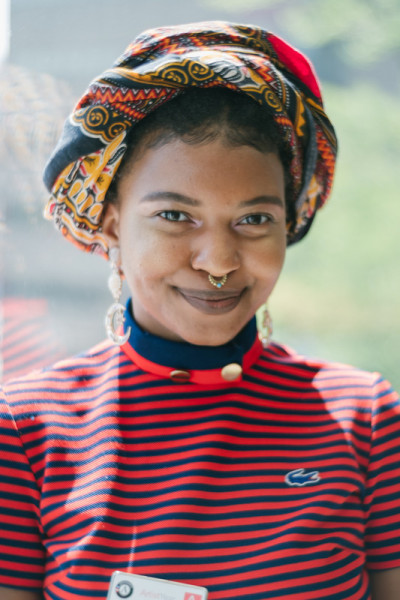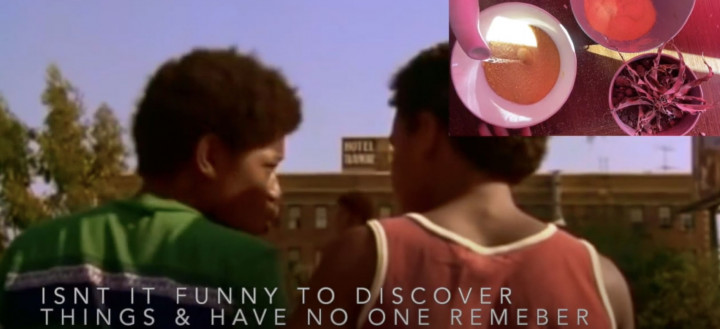
Qiaira Riley is a second-year MFA student in the Socially Engaged Studio Art program. She is a Sagittarius, fourth-generation Chicago native and interdisciplinary artist based in Philadelphia. Riley's MFA in Progress exhibition is on view October 10 - 17 in The Galleries at Moore.
Share your qualifying review question and plans you have for your final year at Moore in thesis writing and thesis exhibition/project.
During my time at Moore, I’ve become very interested in the connection between food and ancestral veneration. My qualifying review question—How do we archive the experiences of our ancestors?—was inspired by not only my own memories of my great-grandmother and our experiences cooking together, but also a collective Black American femme cooking phenomenology.
In my second semester, I started the Princess Pamela Project, which I describe as a community cooking series. Acting as a surrogate descendant to chef and restaurateur Princess Pamela, I attempt to recreate each recipe from her 1969 soul food cookbook 12 times with 12 different people. The number 12 signifies my birth month and the number of seats in Princess Pamela’s restaurant that she ran out of her Manhattan apartment in the 1960s.
As I began cooking with and for other people, I started to understand these interactions as intimate moments to enact care as a part of a larger and longer Black cooking phenomenology. I was intrigued with finding other moments where I could give and receive this form of care in other spaces. As a person who is well-meshed in the internet realm, I realized I could note similar moments of care (or a lack of) in cyberspace, and began to focus my thesis question around simulacra and Black women and gender-variant internet art.
I plan on utilizing the MFA in Progress exhibition as a space to mesh my thesis interests and studio practice. I’ve created an Instagram Live series titled Internet Friendz, where I ask Black women and enbys* to make a meal, which I cover the cost of, that a female ancestor shared with them, and then eat the meal as I interview them about the connection between their virtual presences and their creative practices.
 How do you plan to use your MFA in Progress exhibition as an opportunity to work toward those goals of the final work, or to explore other concerns?
How do you plan to use your MFA in Progress exhibition as an opportunity to work toward those goals of the final work, or to explore other concerns?
I’m really excited to begin Internet Friendz, because I think it will open up some really interesting conversations about how other Black queer creative utilize and experience cyberspace, and allow me to understand different ways that art can be created on and for the internet. I hope to explore how these folks utilize their virtual presences to demonstrate the internet’s potential as a liberatory creative space for themselves and their descendants. I’m also very interested in how folks respond to food in the virtual realm and hope these conversations can explore that intersection.
Share some of the themes/doctrines/values that inform your work and creative process. What are some of the ethical considerations, audience engagements or social impact goals that your work has or will be confronting?
I’m really interested in the concept of phenomenology in the work of folks like Janine Antoni and Chris Burden. As a community-based artist, I think the experiences I can give myself and the folks I want to interact with my work are more interesting than what I can put in a gallery. I’m particularly inspired by this quote from Antoni: “I work differently from a lot of conceptual artists who begin their process with an idea: I begin with the idea of an experience I want to give myself. The meaning reveals itself to me through the experience, through the process."
I’m particularly intrigued by the history and experiences associated with Black women’s cooking phenomenology and seek to work with folks familiar with that tradition. I am also very interested in the notion of labor and care within my work. I hope that the folks I cook with and for feel cared for and can take space to give themselves care. I am very careful about who I don’t and do perform labor for, what kind of labor I perform for others, and what kind of labor I allow people to do for me. I constantly question who my labor is for, who should get to benefit from it, and ultimately attempt to center queer Black women and trans folks as much as I can within my artistic and emotional labor.
*Non-binary people
